|
Week one of the conference ended with the elections on 24 October of Malcolm Johnson as the next Deputy Secretary-General of ITU, François Rancy re-elected as Director of ITU's Radiocommunication Bureau, Brahima Sanou re-elected as Director of the Telecommunication Development Bureau, and Chaesub Lee elected as Director of the Telecommunication Standardization Bureau. Secretary-General Elect Houlin Zhao was elected on 23 October.
Malcolm Johnson elected as next Deputy Secretary-General of ITU
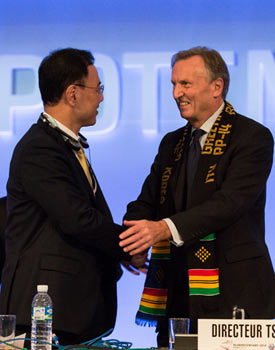 Malcolm Johnson of the United Kingdom was elected Deputy Secretary-General of ITU with 104 votes in the fourth round of voting. In this round, 168 countries were present and voting and the required majority was 85. Runner-up Shola Taylor of Nigeria received 64 votes.
Malcolm Johnson of the United Kingdom was elected Deputy Secretary-General of ITU with 104 votes in the fourth round of voting. In this round, 168 countries were present and voting and the required majority was 85. Runner-up Shola Taylor of Nigeria received 64 votes.
Elections for the post of Deputy Secretary-General began on 23 October, with five candidates standing for the position. Apart from Malcolm Johnson and Shola Taylor were Magdalena Gaj of Poland, Bruce Gracie of Canada, and Fatimetou Mohamed-Saleck of Mauritania.
Speaking after his election, Mr Johnson thanked the United Kingdom government for its support to his candidature, especially Ambassador Karen Pierce and her delegation. He also thanked all the Member States that voted for him for placing their trust in him.
Congratulating his fellow candidates on their fair and professional campaigns throughout the excitement of the electoral process, Mr Johnson said "Having such a qualified and diverse field of candidates is testament to our commitment to the Union and bodes well for its future. I hope we can rely upon their continuing participation in ITU and I look forward to working with them over the next four years."
He thanked Secretary-General Dr Hamadoun I. Touré and his fellow elected officials for their support and cooperation over the past eight years during his tenure as Director of the Telecommunication Standardization Bureau. "It has been a privilege to have been a member of Hamadoun's management team over these years", he said, describing as "excellent" his relations with Secretary-General Elect Houlin Zhao, as well as with François Rancy and Brahima Sanou.
Mr Johnson thanked all Member States, Sector Members, Associates and Academia members who have supported the work of the ITU Telecommunication Standardization Sector (ITU-T) over the past eight years and commended the "excellent ITU staff for their support and dedication to the Union."
In concluding, he said "Most of all I thank my wonderful wife Catherine for her tireless support, wise counsel and forbearance with my frequent absences from home on mission." Looking forward to working with the entire membership over the next four years, he stated, "I am sure we will continue the success of the current team. Of course we will miss Hamadoun Touré, but I am sure his spirit and presence will always be with us."
The United Kingdom delegate, welcoming the support for Malcolm Johnson, pointed out that the conference had been fortunate to have such outstanding candidates for the post of Deputy Secretary-General. "ITU is well assured of the brightest possible future when the best possible candidates are willing to put themselves forward, as we have found in this campaign. Fatimetou Mohamed-Saleck, Bruce Gracie, Magdalena Gaj and Shola Taylor are outstanding individuals in their fields and I would like to pay tribute to them", the United Kingdom delegate said.
Addressing Malcolm and Catherine Johnson, the United Kingdom delegate said "Malcolm has done a tremendous amount to promote capacity building and development through ITU and throughout the globe, and has acted in the best traditions of the Union. His commitment to accessibility and overcoming the global technology divide has served the membership well, and will continue to serve us as we go forward."
Saluting the work of outgoing Secretary-General, Dr Touré, and recognizing that the membership owe him a huge debt of gratitude for taking the Union forward, the United Kingdom delegate anticipated that "The new Secretary-General and Deputy Secretary-General will together now take ITU to an even more effective, open, liberal, and illustrious future as befits the world's oldest agency."
Congratulating his "good friend, Malcolm Johnson, and Catherine Johnson", on behalf of the Union's leadership and on behalf of all the staff, Dr Touré said "Malcolm, you did well, and we are very pleased to see you on this team." He called Mr Johnson's election "another testimony of the membership's trust in the leadership of this current management team. Having elected the Deputy Secretary-General and the Secretary-General from the current team − that is really a very good measurement of your trust in this team."
Dr Touré congratulated and thanked all the candidates. "They have raised the bar very high in terms of the ideas that they have put forward during the campaign, and I hope those ideas will not just fade away". He expressed the hope that the newly elected management team would take on board all the innovative ideas put forward by all the candidates.
Dr Touré called the election "a very fair, transparent, and balanced competition", adding that "each and every competitor has behaved himself or herself in a most professional manner." He congratulated the United Kingdom government for "the support they have had for Malcolm's candidature, and for the way they have conducted the campaign."
All speakers who took the floor acknowledged that this has indeed been an exciting yet courteous election, with an outstanding range of candidates, all of them highly qualified professionals. Delegates from all regions of the world were unanimous in expressing their support and encouragement for the new management team and in thanking the candidates for showing so much interest in the post of Deputy Secretary-General.
Thanking regional representatives for their congratulatory remarks, Mr Johnson said "I think it is very appropriate that the regional representatives have spoken. I have always placed a lot of importance on the work of the regional offices in ITU, and how they can make our work more efficient." He added "I promise that I will work very closely with all ITU regional offices."
François Rancy re-elected as Director of the ITU Radiocommunication Bureau
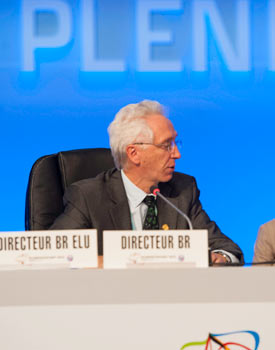 François Rancy of France was re-elected Director of ITU's Radiocommunication Bureau (BR) with 166 votes. There were 166 countries present and voting and the required majority was 84.
François Rancy of France was re-elected Director of ITU's Radiocommunication Bureau (BR) with 166 votes. There were 166 countries present and voting and the required majority was 84.
"I am overwhelmed by the trust you are putting in me in electing me for the second time as Director of the Radiocommunication Bureau," Mr Rancy said following his election. He expressed profound gratitude to all delegates and their governments, in particular to the government of France, which put forward and supported his candidacy. "Also, I would like to express my gratitude to my beloved wife, Dorothy," Mr Rancy added.
Mr Rancy called it "a privilege and a great pleasure" to serve the membership and to have worked with all of them in achieving the goals of ITU and the objectives of its Radiocommunication Sector. "This work has been greatly facilitated by the outstanding quality of the relationship between the five elected officials of the Union. It has been an honour to work under the inspiring leadership of Hamadoun Touré, my friend, and in very close cooperation with Houlin Zhao, Malcolm Johnson and Brahima Sanou, who are also my friends, and to work as one team and one ITU."
During these four years, Mr Rancy explained, remarkable results have been achieved by the ITU Radiocommunication Sector in managing the frequency spectrum worldwide, in adopting standards and best practices, and in disseminating information and know-how to the entire ITU membership.
Highlighting these achievements, Mr Rancy also noted that a lot remains to be done to ensure that the management of spectrum and orbit resources by ITU continues to feed the development of radiocommunications and connectivity to all citizens of the world. "I am deeply honoured to benefit from your support to continue this work together with all of you for another four years to pursue this objective."
The French delegate said that François Rancy's re-election recognizes the remarkable work he has done at the helm of the Radiocommunication Bureau. Thanking all the delegations for their support, the delegate called it a very important moment not just for Mr Rancy, but for France as well. "François Rancy is a remarkable professional. He has a remarkable track record, and he is also a gentleman. Bravo! We wish you all the best in the future. The Radiocommunication Bureau has great challenges before it and we are certain that Mr Rancy will be able to address them and overcome them."
Brahima Sanou re-elected as Director of the ITU Telecommunication Development Bureau
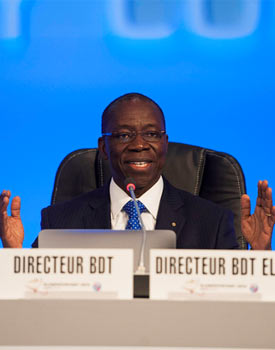 Brahima Sanou of Burkina Faso was re-elected as Director of ITU's Telecommunication Development Bureau (BDT) with 166 votes. There were 166 countries present and voting and the required majority was 84.
Brahima Sanou of Burkina Faso was re-elected as Director of ITU's Telecommunication Development Bureau (BDT) with 166 votes. There were 166 countries present and voting and the required majority was 84.
Speaking after his election, Mr Sanou, conveyed his deepest gratitude to ITU Member States from the five regions for the confidence shown in him once again. Describing his re-election as an honour for him and for his country, he first thanked the President of Burkina Faso, His Excellency Blaise Compaoré "for his personal commitment and support". He then thanked the Prime Minister and the entire government of Burkina Faso, represented by Jean Koulidiati, Minister of Development, the Digital Economy and Posts, and Ambassador Prosper Vokouma, the country's Permanent Representative to the United Nations in Geneva. They "have always stood by my side", he said.
Mr Sanou thanked the whole team responsible for promoting his candidacy and, of course, the African Union. "At this solemn moment, please allow me to proudly recall the devotion and the support of my wife, Aminata, who is here in the room. And that of my three daughters, Djamilah, Eva, and Nafissa", he said.
To Dr Touré, Mr Sanou had this to say: "You once spoke to me about an old lady from Malaysia who was very wise, who used to say to her son, 'What belongs to you is what you gave willingly and freely'. You will leave at the end of the year very rich in what you have given freely to the ITU. You will leave holding your head high, enriched with the kindness and humility that you have shown on a personal level." He wished Dr Touré and his family every success in the future, and was sure that he would pursue his destiny "in making human history."
Congratulating Malcolm Johnson and François Rancy, Mr Sanou said "the years we have spent together have been years of professional enrichment and friendship on a personal and family level. I am gratified that the Member States have given us the opportunity to continue to work together." Mr Sanou conveyed his warmest congratulations to Secretary-General Elect, Houlin Zhao, upon his outstanding election to direct ITU at the highest level. "I had the opportunity to benefit from your professionalism, your kindness and your wisdom over the past four years. I would like to assure you of my unswerving support in continuing with the teamwork that we have begun together."
He asked the Chairman of the Conference, Wonki Min, to convey his "deepest gratitude to the government of the Republic of Korea and the authorities of the city of Busan, because Busan is one of the places which have given me the happiest memories in my life."
The delegate of Burkina Faso said that by re-electing Mr Sanou to the post of Director of the Telecommunication Development Bureau countries had expressed renewed confidence in him and reaffirmed their confidence in Burkina Faso and in Africa. On behalf of the President of Burkina Faso and the government and people of Burkina Faso, the delegate conveyed his deepest gratitude to the African Union, whose Heads of State supported the candidature of Mr Sanou.
Chaesub Lee elected as new Director of the ITU Telecommunication Standardization Bureau
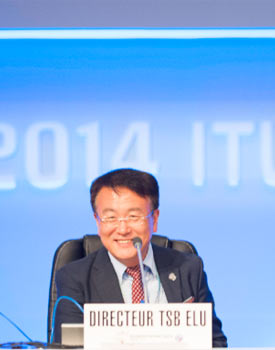 Chaesub Lee of the Republic of Korea was elected as Director of ITU's Telecommunication Standardization Bureau (TSB) with 87 votes. There were 169 countries present and voting and the required majority was 85. Bilel Jamoussi of Tunisia received 50 votes and Ahmet Erdinç Çavuşoğlu of Turkey received 32 votes.
Chaesub Lee of the Republic of Korea was elected as Director of ITU's Telecommunication Standardization Bureau (TSB) with 87 votes. There were 169 countries present and voting and the required majority was 85. Bilel Jamoussi of Tunisia received 50 votes and Ahmet Erdinç Çavuşoğlu of Turkey received 32 votes.
Mr Lee thanked all delegates for their warm support and for putting their trust and confidence in him by electing him to the helm of one of the most important functions in ITU, the Telecommunication Standardization Sector (ITU-T), for the next four years. He expressed his deep gratitude to the government of the Republic of Korea for presenting his candidacy, and his sincere thanks to Yanghee Choi, Minister of Science, ICT and Future Planning, and to all who supported him in his election campaign.
"At this moment, I would like to thank my dear wife, KIM YeonSoo, who is here with me in this room", he said. He recalled meeting her in 1979, and said that since then she has shared her life with him, devoting herself to supporting him, continuously praying to God, and looking after their son and daughter.
Having participated in the work of ITU-T study groups for 27 years, Mr Lee took the opportunity of his election to express his gratitude to colleagues, especially those in ITU-T Study Group 13, as well as to TSB staff, for all their efforts. He also paid tribute to the other candidates for the post of Director of TSB. The standard of competition has been high and the campaign has been unfailingly friendly. "I am sure we will continue our friendship and work well together", he said.
Noting that ITU would be celebrating its 150th anniversary in 2015, he reminded delegates that ITU-T would celebrate its 60th anniversary in 2016. "ITU-T (previously CCITT) has contributed remarkably to building today's information society. In Asia, 60 years means accomplishing one big cycle of one's life and starting again on a new cycle. So I believe ITU-T is at one of its most important moments for continuous development of future ICT and telecommunications. This should be part of the next cycle of ITU-T", he said.
As the TSB Director elect, Mr Lee pledged to enhance the value of ITU-T activities and products, as well as the efficiency and effectiveness of collaboration within and outside ITU-T. "In addition, I will do my best to make ITU deliver excellent services as part of the new management team, collaborating with the existing management team, also working together with the new Secretary-General and Deputy Secretary-General, and the other Directors", he said.
The Republic of Korea's Minister of Science, ICT and Future Planning, Yanghee Choi, expressed deep gratitude to Member States for electing Mr Lee, noting that the government of his country well understood the significance of TSB and the role of the Director. The Minister observed that since joining ITU in 1952 the Republic of Korea had achieved remarkable growth in the global ICT sector. "I believe such growth has been possible thanks to the all-out support by ITU and the international community" he said, explaining that the government of the Republic of Korea had been seeking an opportunity to give something back to the international community by sharing its experience accumulated so far. "Today such an opportunity has finally come to the Republic of Korea with Dr Lee's election to the post of TSB Director. The Government, along with Dr Lee, promise to contribute to ITU and the ICT sector worldwide", he added.
The Secretary-General, on behalf of the whole team at ITU, offered heartfelt congratulations to the Directors of the Bureaux on their election. He also congratulated their countries, France, Burkina Faso and the Republic of Korea, for having presented and supported their candidatures throughout the long campaign.
Dr Touré referred to his team as the "dream team", commenting that "The excellent work that they have done over the past four years and also the principles which we have applied to our Union, the principles which we all share − about working as a team, in mutual respect, mutual trust, confidence and competence − these were the key notes for the work of my team. So we are very grateful for the confidence you have placed in us." He congratulated Member States on choosing the new team, adding that "I have full confidence in the choices you have made."
Countries were unanimous in congratulating all the candidates for all the campaigns. As one delegate put it "When you are growing up, you are taught in sports that it is not whether you win or lose, but how you play the game." That delegate added that "All of the candidates over the last two years have played this game with honour, integrity and decency, and if the winners govern the way they ran, it will serve this Union well."
Internet resolutions take centre stage
Internet-related issues took centre stage at the third meeting of the Working Group of the Plenary (WGPL) on Friday, 24 October. The following resolutions were addressed as a package: Resolutions 101 (Internet Protocol-based networks), 102 (ITU's role with regard to international public policy issues pertaining to the Internet and the management of Internet resources, including domain names and addresses), 133 (Role of administrations of Member States in the management of internationalized (multilingual) domain names) and 180 (Facilitating the transition from IPv4 to IPv6).
Four proposals for new draft resolutions
The meeting also addressed the following four proposed draft new resolutions:
-
New draft resolution from the Americas on Voluntary guidelines and best practices for designing, installing and operating internet exchange points (IXP).
-
New draft resolution from the Americas on Preserving and promoting multilinguism on the Internet for an integrating and inclusive information society.
-
New draft resolution from Paraguay on Bridging the international connectivity divide.
-
New draft resolution from India on ITU's role in realizing a secure information society.
Internet-related matters is a topic that often generates divergent views, as observed in the contributions to this conference and from past experience. The meeting agreed to set up an ad-hoc group, chaired by Fabio Bigi of Italy, to deliberate on Resolutions 101, 102, 133, 180 and also on the proposed draft new resolutions.
The Chairman noted that in the contributions on Resolution 102, there are proposals to revise the rules and procedures for various aspects of the Council Working group on international Internet-related Public Policy Issues (CWG-Internet). He asked the meeting to bear in mind that there are contributions calling for a revision of Decision 11 on the Creation and management of Council working groups, which will have an impact on the rules and procedures of CWG-Internet.
Policy statements in brief
Barbados: Darcy Boyce, Minister with responsibility for Telecommunications, Prime Minister's Office, expressed appreciation for ITU's continuing support in helping the country develop its ICT sector and said he had high hopes for a successful PP-14 as ITU prepares to celebrate its 150th anniversary.
Australia: Nerida O'Loughlin, Deputy Secretary, Department of Communications, reaffirmed Australia's support for ITU's vision of the future of the ICT sector for Connect 2020 and beyond and expressed confidence that it is well adapted to meet the challenges of the digital age.
Mongolia: Jadambaa Tsagaan-Uvgun, Chairman, Information Technology, Post and Telecommunications Authority, outlined ICT developments in Mongolia, particularly efforts to make the analogue to digital switchover, and commended ITU for helping to deliver the benefits of ICT to all people of the world.
Botswana: Thari G.Pheko, Chief Executive, Botswana Communications Regulatory Authority, said "Botswana has seen an influx of ICT devices some of which are substandard and may be harmful to consumers, a challenge that we are addressing. We continue to benefit from ITU Recommendations and studies to make our ICT environment a more conducive one." He added that through the ITU-IMPACT partnership Botswana has set up structures to address this challenge and recently undertook a capacity-building programme on cybersecurity and assessment for its stakeholders.
Bulgaria: Julieta Tencheva, Head, International Relations in IT and Communications, Ministry of Transport, Information Technology and Communications, said Bulgaria has developed a modern telecommunication infrastructure and, in cooperation with ITU and other international organizations, has successfully implemented reforms that have resulted in a competitive electronic communication market and high quality ICT services.
Brunei Darussalam: Mohamad Riza Mohamad Yunos, Deputy Permanent Secretary, Ministry of Communications, said: "We are gathered here over the next few weeks to set out an ambitious vision and framework for the telecommunication and ICT sector for the year 2020. The creation of the Connect 2020 vision and framework is appropriate as ITU charts a new direction to facilitate the growth and development of ICT in a globally connected world."
Bahamas: Allyson Maynard Gibson, Attorney General and Minister of Legal Affairs, Government of The Bahamas, said: "This meeting provides a unique opportunity for Member States and industry experts with varying levels of ICT development to benefit from the exchange of ideas and best practices and to articulate a global vision for the development of information and communication technologies over the ensuing years of this decade."
Zambia: Yamfwa Mukanga, Minister, Ministry of Transport, Works, Supply and Communications, described Zambia's progress in developing its ICT sector and pledged to continue working closely with ITU.
Spain: Víctor Calvo-Sotelo, Secretary of State for Telecomunications and the Information Society (SETSI), recalled Spain's longstanding and collaborative relationship with ITU, offered to share its successful experience in ensuring universal broadband access, and stressed the importance of applying the principle of equality in the use of all six ITU languages.
Switzerland: Philipp Metzger, Director General, Federal Office of Communications (OFCOM), said Switzerland salutes ITU's implementation of a results-based management system, that it is imperative that PP-14 develops a balanced ITU financial plan budget for 2016-2019 and that ITU ensures its transparency in facing the challenges ahead.
Saint Lucia: Embert Charles, Managing Director, Eastern Caribbean Telecommunications Authority, said "We can achieve so much more if we work together" towards ensuring that the ICT sector becomes a socio-economic growth engine for all.
|
Quick Links
Photos and Videos
Malcolm Johnson: B-Roll
François Rancy - Acceptance Speech
Brahima Sanou - Acceptance Speech
Chaesub Lee - Acceptance Speech
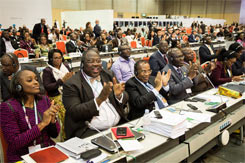
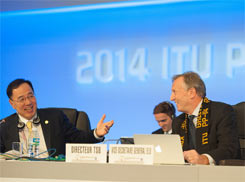
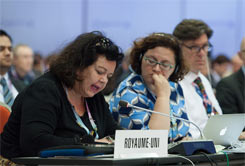


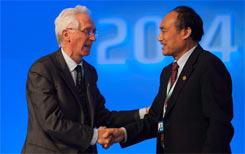



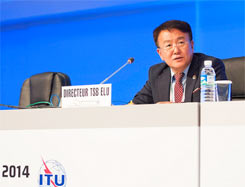
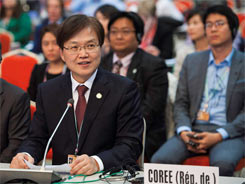


|
|
